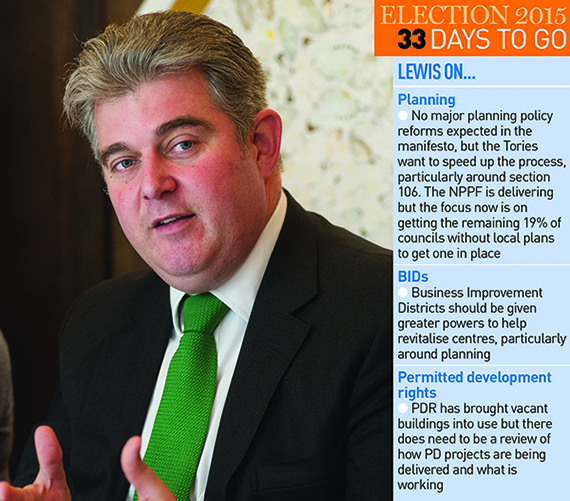Just days before parliament was dissolved and the countdown to the 7 May general election began officially, housing and planning minister Brandon Lewis took part in the second of Capital & Regional’s and Mishcon de Reya’s political debates to outline the Conservatives’ view on building and expanding the UK’s towns and cities.
While Labour’s proposals were about planning and partnerships (28 March, p33) – with a little bit of “if you don’t do it, we’ll do it for you” – the Tories were about embracing the Power of Nudge.
“We had a pretty heavy top-down planning system,” Lewis told the audience. “We moved it to a localised system with local plans and neighbourhood plans. At the time we were told that that would result in nothing getting done. In fact, quite the opposite has proved true. It is now bedded in and we have 81% of areas with published local plans, we have 1,400 areas covering 6.1m people with neighbourhood plans and last year we saw near record numbers of planning applications go through – 253,000 in total.”
The power of the nudge was the product of trusting the people to do the right thing. Lewis said that neighbourhood plans would often start as how not to build near people’s homes, but in the end would see people working together to use the plans to build the right kind of developments in the right places.
“Trusting people to do that is now paying dividends. The more that embeds, the easier it will get,” he said. “The more we get developments of appropriate design and quality, the more people move away from saying, ‘I don’t want that’ to saying, ‘I don’t mind some of that’.”
“People do understand their local area,” he added, “and once they get into it, they come up with some solid decisions.”
But there is still more work to be done when it comes to rejuvenating the high street, said Lewis.
“While the high street is changing so quickly, changing what you do in the high street often happens slowly,” he said. “I’m keen that we start moving towards more flexibility regarding use classes – and we’ve done some of that – but I also think there is more to do. It’s important that we start giving more powers to local authorities.”
He reckoned that some local authorities had still not quite grasped the how important the high street was to them.
“If they want business rate growth, let alone council tax and the new homes bonus, all these things come together by having a proactive planning policy. And the local plan is a real driver for that,” said Lewis.
He said that while local authorities had the ability to take control and manage town centres, he was unsure whether they had the focus, determination and awareness needed. “There is still a lot of work to do around empowering and educating local authorities about the power they’ve got,” said Lewis.
“Councils have got to understand that they should be getting on and doing it and being more innovative. I don’t think enough have really worked out why their town centres matter to them.”
If you have a healthy high street, said Lewis, more people want to live there and more developers want to develop there. That means more new homes bonuses and more council tax.
“If you are looking at it from a fiscal point of view, the officers in the local authority should be promoting a strong, vibrant town centre,” said Lewis. “Councils have got to get more focused. They can make a difference.”
The problem for Lewis, it seems, is not with the planning system as it stood – although he did admit that the system needed to be made quicker (see box) – but in the nation’s inability to show off.
“We are slow at sharing best practice,” he said. “We are British, so if we do something well we are humble about it and don’t want to tell anyone about it. Then if we do brag about it we have the other side of our Britishness saying, ‘It will never work around here’.”
He concluded: “The challenge with all of these things is getting the message to the areas that are not engaged and that is where the temptation comes to go in with your hobnail boots on and tell them to do something as opposed to giving them a good reason to do it themselves.
“The problem with going in with hobnail boots is that councils will tick the boxes, but they may not get the right outcome. By going in and motivating them, you get the right outcome.”
The Power of Nudge.












